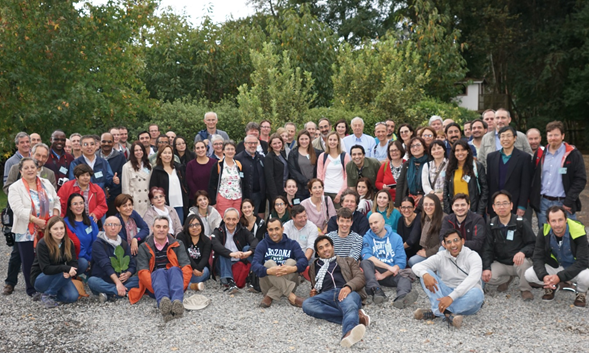TROPICSAFE at the Conference of the International Council for the Study of Virus and Virus-like Diseases of the Grapevine
For the first time, since 1964, the Congress of the International Council for the Study of Diseases caused by Viruses, Viroids and Phytoplasmas in the Vine (ICVG) is held in a South American country. Chile was chosen as the venue for this meeting due to its advanced development in the grapevine and wine industry; an event whose purpose was to debate about advances in epidemiology, diagnosis and plant-pathogen interaction. The Congress was organized by academics from the University of Chile. The 19th edition of the ICVG Congress was held on April 9, 10, 11 and 12, 2018. The event brought together the most renowned experts on grapevine diseases worldwide, represented by 110 professionals and researchers from 26 countries of the world. The Congress was held in the wineries of the Santa Carolina Vineyard, located in the Macul district of Santiago de Chile and was organized by the academics Dr. Nicola Fiore and Dr. Alan Zamorano, from the Department of Plant Health of the Faculty of Agricultural Sciences , together with a team of professionals and researchers.
The Congress counted on the conferences of the most recognized specialists in the area, such as Dr. Giovanni P. Martelli, of Italy; Dr. Maher al Rwahnih of FPS UC Davis, USA; Dr. Assunta Bertaccini, professor at the University of Bologna (Italy). Prof. Bertaccini in addition to presenting the situation and the updates about the phytoplasma disease of the grapevine in the world, presentated to the scientific community of the TROPICSAFE project she is leading and has briefly illustrated the purpose of the four-year research in which Chile, South Africa, Spain and Italy are involved for the studies on grapevine. The objective is to increase the knowledge about diseases associated with the presence of bacteria transmitted by insects such as phytoplasmas in order to achieve a substantial improvement in diagnostic efficiency, as well as, once known the epidemiological elements in the different geographical areas, to develop and apply system strategies of integrated and environmantally safe management.

Opinions of the participants
Felipe Gainza, researcher in Molecular Biology at the Research and Innovation Center (CII) of Viña Concha y Toro, praised this initiative as “ a very enriching experience, since it allowed attendees to know the state of the art and the latest advances in this area study. This type of activities also allows generating national and international collaboration networks, contributing to the knowledge and development of efficient solutions for the industry. For the CII it is key to participate in these events, since it allows us to spread our work and contribute to the strategies that allow resolving the phytosanitary problems of the vineyard” he explained.
For his part, José Ramón Úrbez Torres, a professional from the National Service of Agriculture belonging to the Federal Government of Canada, said that “the congress was fantastic, a very good organization, I emphasize that there were many very high level speakers and it was very interesting to know the research that are made in each country, that has a great value. Also, I give great value to the interactions and networks that we can build based on the work that each one does”.
Meanwhile, Angelantonio Minafra, of the National Research Council of the Government of Italy, said that, “the congress gathers the maximum experience available worldwide on a subject that is relevant from an economic point of view, as are the diseases of the vine. Each congress is a step forward, it is a scientific advance that is offered to the wine producers, because there is always something to prevent or some technology that can improve, there is always progress in these matters”.





